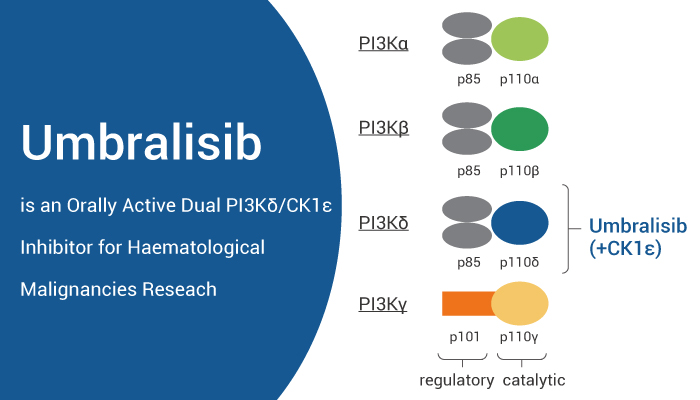PI3K (Phosphoinositide 3-kinase) are a family of related intracellular signal transducer enzymes capable of phosphorylating the 3 position hydroxyl group of the inositol ring of phosphatidylinositol (PtdIns). Class I PI3K enzymes consist of four distinct catalytic isoforms, PI3Kα, PI3Kβ, PI3Kδ and PI3Kγ. In mammalian cells, PI3K signaling occurs upon binding of a regulatory subunit (p85 or p55) with a catalytic subunit (p110α, β, δ, or γ). In cells of hematopoietic origin, expression of the p110 PI3Kδ catalytic subunit predominates and plays essential roles in B-cell development, survival, and function.
Besides, casein Kinases (CKs) exist in at least seven isoforms (α, β, γ1-3, δ, and ɛ) in mammals and CK1 kinases phosphorylate various substrates to play vital roles in diverse physiological processes such as DNA repair, cell cycle progression, cytokinesis, differentiation, and apoptosis. Among them, CK1ε is implicated in modulating various human health issues such as cancer, neurodegenerative diseases, and diabetes.
Umbralisib (also known as TGR-1202 or RP5264) is an orally active, potent and selective dual PI3Kδ and CK1ε inhibitor.
In addition, Umbralisib has enhanced selectivity for inhibiting p110δ over other PI3K isoforms. Importantly, Umbralisib exhibits unique immunomodulatory effects on chronic lymphocytic leukemia (CLL) T cells. In ex vivo studies, Umbralisib sustained normal and CLL-associated FoxP3+ human regulatory T cells (Tregs). Furthermore, Umbralisib exhibits antitumor efficacy in the Eμ-TCL1 adoptive transfer mouse CLL model. Moreover, Umbralisib also preserves Treg numbers and function. The differential impact of Umbralisib on Tregs compared with other PI3Kδ inhibitors has several clinical implications. First, the cancer cell-intrinsic inhibition of PI3Kδ and CK1ε by Umbralisib uniquely provides multiple strategies of antitumor efficacy in B-cell malignancies. Second, lack of Treg impairment by Umbralisib may negate potential Treg-mediated antitumor effects in B-cell malignancies, as well as in the setting of immunotherapy for solid tumors.
To sum up, Umbralisib is an orally active dual PI3Kδ and CK1ε inhibitor, has the potential for marginal zone lymphoma and follicular lymphoma research.
References:
[1] Maharaj K, et al. Blood Adv. 2020 Jul 14;4(13):3072-3084.
